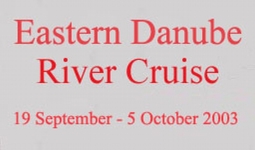Sunday, 5 October. We were up at 6:00 and had our luggage out by 6:30. It was a dismal, rainy day,
but who could complain after all the beautiful weather we'd had. The bus left for the airport at 7:30.
Unlike most large cities, Budapest's airport is close in, so we were there by 8:00. Our 10:10 flight was
on time. We changed planes in Frankfurt, gaining an hour due to the time difference. After a slight delay,
we took off about noon. Dinner was served at 3:30, followed by the movie. The film, Charlie's Angels,
was so bad that we both stopped watching it after five minutes. After another meal at 8:30
p.m. (2:30 EST),
we touched down at Dulles at 4:15 (EST).
The immigration process was very fast, but the luggage was very slow. Ours was the last to come, and it was 5:20 before we left the customs area. Julia was waiting for us and drove us to Culpeper, where we picked up our car. We were back home in Massanutten just after 8:00. General Observations. In spite of the inconveniences caused by low water levels in the Danube, it was a very nice trip, though less so than our Russian river cruise. Our tour directors did a good job of salvaging as much of the originally scheduled itinerary as practical in the face of the low water problem in the Danube, as well as other hitches (slow train to Constanta) that popped up. However, we think Grand Circle could have done a better job of alerting us in advance of the low water level and given us the option of rescheduling. We had very little contact with any ordinary people of the countries we visited. As recounted above, our "home luncheon" was somewhat of a disaster. Unlike similar experiences we've had in several other countries, the Bulgarian family we visited seemed to treat our visit strictly as a business. There was no warmth or effort to be friendly. But I certainly would not generalize from that one experience. Three of our four tour directors, as well as the ship doctor, were Romanian. They all were efficient, pleasant, and friendly, but of course, that's their job. We had been to "western" Eastern Europe before (Yugoslavia before the breakup, Poland, Czech Republic, Slovakia, Hungary), but this was our first visit to Romania and Bulgaria. From the little we saw of them, we found both fascinating. Each of these countries has a distinctive history, but with long periods of domination by the same foreign powers (Roman, Byzantine, Ottoman, Soviet) as the common denominator. Although the years behind the Iron Curtain clearly have devastated their economies, they seem to be at an additional disadvantage compared to some of the more northern and western Iron Curtain countries. One factor is distance, but it's my impression that Western Europe has for centuries harbored a strong prejudice against the area of southeastern Europe that was ruled by the Byzantine Empire. This is so even though (perhaps because?) that region had a very advanced civilization when Western Europe was largely barbarian. The centuries of Ottoman domination in southeastern Europe undoubtedly contributed greatly to Western Europe's superiority complex. (Only Greece, because of its historic role as the cradle of western democracy and of western civilization, seems to have escaped this discrimination, and even then, only partially.) On top of this already severe handicap, the decades under communism clearly have devastated the already fragile economies of Romania and Bulgaria. Although they aspire to join the European Community, they have a long way to go to meet the qualifications. They both have a lot to offer for tourists, as our visits to Constanta and Veliko Tarnovo demonstrated. Romania especially seems to be making an effort to capitalize on this, but both countries lack the infrastructure to handle too great an influx of tourists. Also, relatively few western tourists know much about the history and culture of southeastern Europe, and that could be a hindrance. Although the Danube cruise between Budapest and the Black Sea is becoming fairly popular, having seen it I have to say that the Danube between Bulgaria and Romania does not seem to have the tourist potential of many other European rivers because most of the riparian area is so flat, featureless, and sparsely settled. Both Serbia and Hungary suffered long periods of foreign domination similar to those of Romania and Bulgaria. Although it definitely has been set back a lot by the civil war that led to the breakup of Yugoslavia, as well as the 1999 Kosovo War with its NATO bombing, Serbia seems more advanced economically than Bulgaria and Romania, . Hungary is still more advanced and has made big strides even since our earlier visit just four years ago. I have no doubt that all these countries will succeed in boosting tourism significantly over the years. It will be a long time, however, before they begin to approach the level that prevails in most of Western Europe. And at least for the tourists, that's a good thing.
Copyright © 2000-2023 DarrellPeck.com All rights
reserved. | |||

